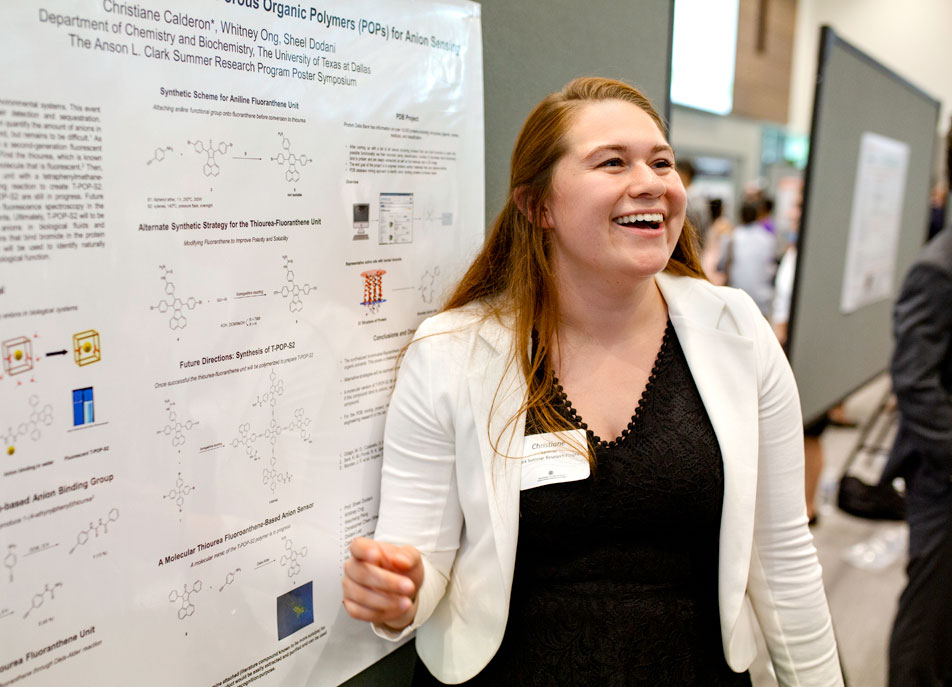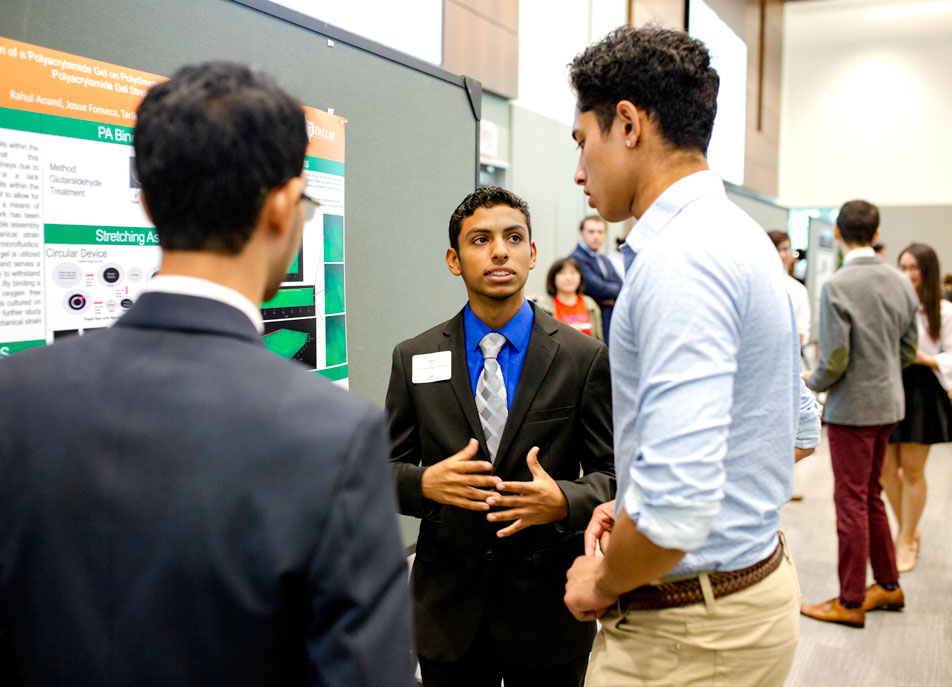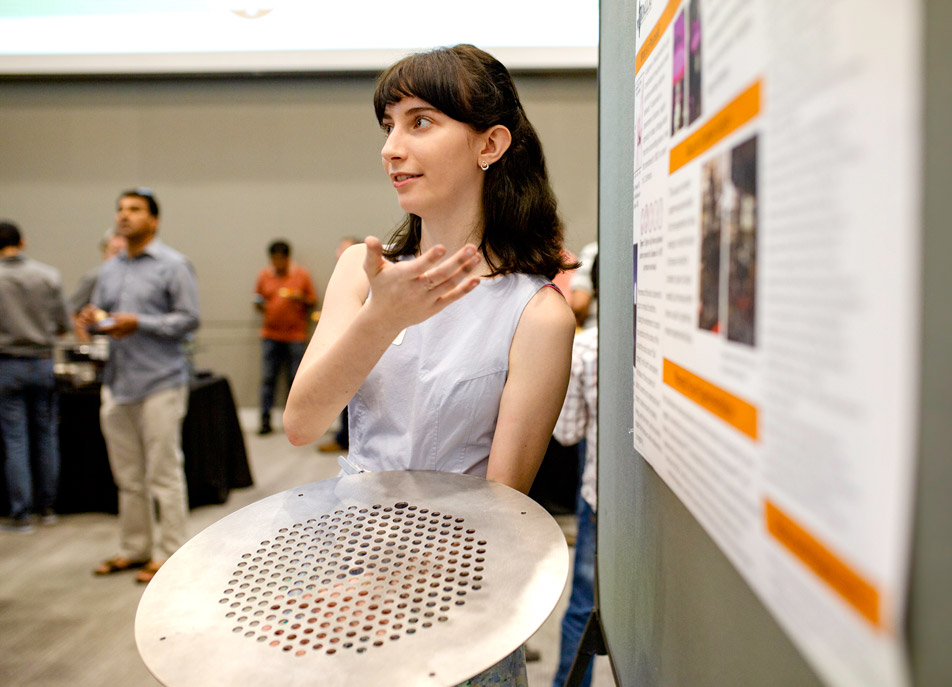Largest Group of Clark Scholars Seizes Early Lab Work Opportunity
By: Office of Media Relations | Aug. 27, 2018
A record number of students took part in the Anson L. Clark Summer Research Program, now in its 50th year.
More than tripling the participant count from 26 to 79 “Clarkies” was just the start in terms of changes to the program, which gives immediate research participation opportunities to incoming freshmen at The University of Texas at Dallas.
After-hours activities, classes and events were added to the extracurricular offerings of past years, all designed to help the new UT Dallas students become Comets.
The Clark program began in 1968 at the Southwest Center for Advanced Studies, which would become UT Dallas the next year. Across a half-century, hundreds of outstanding undergraduates and recent high school graduates have come to campus to work with faculty mentors in various fields.
Overseen by the Hobson Wildenthal Honors College, this year’s Clark Scholars spent nine weeks conducting research, which wrapped up in early August with the annual research symposium.
“The objective of the Clark program is to enrich the academic experience of our students by providing an opportunity for them to conduct hands-on research with some of UT Dallas’ nationally recognized faculty and talented postdoctoral, graduate and undergraduate students,” said Wendi Kavanaugh MA’04, MFA’10, an assistant director with the Honors College who oversees the Clark program.
No previous research experience is required for Clark Scholars, who are each assigned to a faculty research mentor for the duration of the program. This year’s 54 faculty mentors came from the School of Behavioral and Brain Sciences, the School of Natural Sciences and Mathematics, the Erik Jonsson School of Engineering and Computer Science, and the School of Arts, Technology, and Emerging Communication.
Dr. Sheel Dodani BS’07 was a Clark Scholar before her freshman year at UT Dallas. Now an assistant professor of chemistry, she mentors a Clarkie of her own. She believes the program gives students an early glance at a potential career path, as well as teaching them essential things about themselves.
“When a student gets a chance to join a lab through the Clark program, one of the first things they figure out is if they want to be a scientist, if that career is for them,” Dodani said. “I also think they mature as a problem-solver; they figure out how to adapt, because science is an ever-changing game. Every day in the lab is different. That’s what I love about this job.”
Overseen by the Hobson Wildenthal Honors College, Clark Scholars spend nine weeks conducting research, wrapping up in early August with the annual research symposium. If you don't see the video, watch it on Vimeo.
Dodani’s Clark Scholar this year was Christiane Calderon, a biochemistry freshman who emphasized the importance of the hands-on experience of working on her own experiment.
“It’s one thing to watch something be done on YouTube, or see a picture of it,” Calderon said. “But it’s another to get your hands dirty in a lab — to come here every day and do something different.”
Beyond its research component, the Clark program also includes a significant community component.
“There have been faculty-led roundtable discussions, museum trips and fun activities to help the students integrate into UT Dallas,” Kavanaugh said. “Our student peer advisors have created several events based on what the Clarkies would like to do and learn, helping to tailor their summer experience.”
Dr. David Schmidtke, a bioengineering professor in the Erik Jonsson School of Engineering and Computer Science, mentored two freshmen. He explained that having fresh faces in the lab can yield new, creative ideas.
“They come from a different perspective, asking, ‘Why are you doing it this way?’” Schmidtke said. “Sometimes, it makes us rethink and come up with better ways of doing things.”
Tarik Shihabeddin, a bioengineering PhD student in Schmidtke’s lab, complimented the new Comets on their existing knowledge and abilities.
“They have a foundation that’s good enough for them to pick up on the larger ideas behind why we’re doing what we’re doing, and ask the sort of questions that can move a project forward,” Shihabeddin said. “It’s been as useful for the mentors as it has been for the students. I‘ve had a growing experience going through this.”
The Clark program is funded by an endowment from the Anson L. Clark Foundation. Its namesake enjoyed success first as an engineer, then as a physician at the Mayo Clinic, and finally as businessman in the oil and banking industries. His philanthropy has supported scholarly endeavors at several Texas universities including UT Dallas, such as the Dr. Anson L. Clark Presidential Scholarship.
For Josué Fonseca, an incoming healthcare studies freshman from Houston, the experience was far more than he had envisioned.
“I’ve actually been able to make my own experiments, test my own ideas, and it’s been very helpful,” Fonseca said. “UT Dallas gave me an experience that I don’t think I would ever have had somewhere else.”
For Dodani, students like Fonseca and Calderon have exhibited the two crucial characteristics for taking full advantage of this opportunity.
“Be fearless, and be a sponge: Those are the two things that I tell every new student that walks through my door,” she said. “If you have those two qualities, a whole new world opens up to you.”










